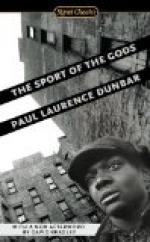Miss Kitty Hamilton had to be very careful about her nerves and her health. She had had experiences, and her voice was not as good as it used to be, and her beauty had to be aided by cosmetics. So she went away from New York, and only read of all that happened when some one called her attention to it in the papers.
Berry Hamilton in his Southern prison knew nothing of all this, for no letters had passed between him and his family for more than two years. The very cruelty of destiny defeated itself in this and was kind.
XVI
SKAGGS’S THEORY
There was, perhaps, more depth to Mr. Skaggs than most people gave him credit for having. However it may be, when he got an idea into his head, whether it were insane or otherwise, he had a decidedly tenacious way of holding to it. Sadness had been disposed to laugh at him when he announced that Joe’s drunken story of his father’s troubles had given him an idea. But it was, nevertheless, true, and that idea had stayed with him clear through the exciting events that followed on that fatal night. He thought and dreamed of it until he had made a working theory. Then one day, with a boldness that he seldom assumed when in the sacred Presence, he walked into the office and laid his plans before the editor. They talked together for some time, and the editor seemed hard to convince.
“It would be a big thing for the paper,” he said, “if it only panned out; but it is such a rattle-brained, harum-scarum thing. No one under the sun would have thought of it but you, Skaggs.”
“Oh, it ’s bound to pan out. I see the thing as clear as day. There ’s no getting around it.”
“Yes, it looks plausible, but so does all fiction. You ’re taking a chance. You ’re losing time. If it fails——”
“But if it succeeds?”
“Well, go and bring back a story. If you don’t, look out. It ’s against my better judgment anyway. Remember I told you that.”
Skaggs shot out of the office, and within an hour and a half had boarded a fast train for the South.
It is almost a question whether Skaggs had a theory or whether he had told himself a pretty story and, as usual, believed it. The editor was right. No one else would have thought of the wild thing that was in the reporter’s mind. The detective had not thought of it five years before, nor had Maurice Oakley and his friends had an inkling, and here was one of the New York Universe’s young men going miles to prove his idea about something that did not at all concern him.
When Skaggs reached the town which had been the home of the Hamiltons, he went at once to the Continental Hotel. He had as yet formulated no plan of immediate action and with a fool’s or a genius’ belief in his destiny he sat down to await the turn of events. His first move would be to get acquainted with some of his neighbours. This was no difficult matter, as the bar of the Continental was still the gathering-place of some of the city’s choice spirits of the old regime. Thither he went, and his convivial cheerfulness soon placed him on terms of equality with many of his kind.




